Unit 14 Lesson 4 Job Trends学案
- 格式:doc
- 大小:35.00 KB
- 文档页数:4
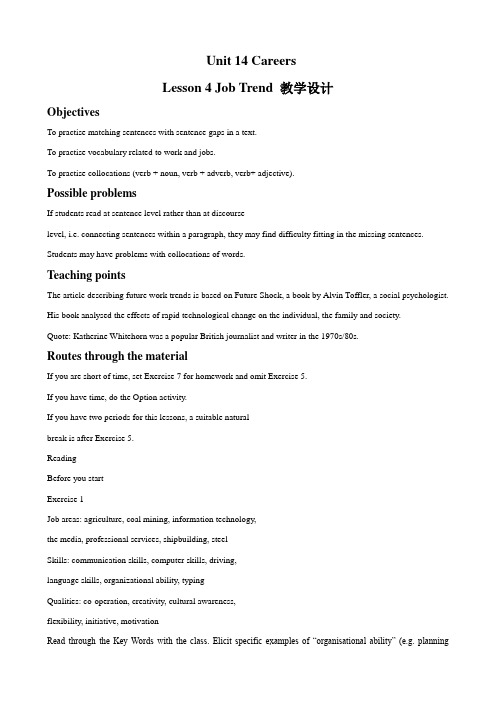
Unit 14 CareersLesson 4 Job Trend 教学设计ObjectivesTo practise matching sentences with sentence gaps in a text.To practise vocabulary related to work and jobs.To practise collocations (verb + noun, verb + adverb, verb+ adjective).Possible problemsIf students read at sentence level rather than at discourselevel, i.e. connecting sentences within a paragraph, they may find difficulty fitting in the missing sentences. Students may have problems with collocations of words.Teaching pointsThe article describing future work trends is based on Future Shock, a book by Alvin Toffler, a social psychologist. His book analysed the effects of rapid technological change on the individual, the family and society.Quote: Katherine Whitehorn was a popular British journalist and writer in the 1970s/80s.Routes through the materialIf you are short of time, set Exercise 7 for homework and omit Exercise 5.If you have time, do the Option activity.If you have two periods for this lessons, a suitable naturalbreak is after Exercise 5.ReadingBefore you startExercise 1Job areas: agriculture, coal mining, information technology,the media, professional services, shipbuilding, steelSkills: communication skills, computer skills, driving,language skills, organizational ability, typingQualities: co-operation, creativity, cultural awareness,flexibility, initiative, motivationRead through the Key Words with the class. Elicit specific examples of “organisational ability” (e.g. planningyour work, organising a meeting) and “communication skills” (e.g. on the telephone, in meetings).Students then discuss the questions in pairs and make notes of their ideas.The pairs then exchange views as a class.Read to learnExercise 2Read through the strategies with the class. Follow the stages reading the first two paragraphs and sentences a-f to show students how to find a sentence that matches the gap.Students work individually, following the stages in theReading Strategies and fitting the sentences into the gaps.Students compare answers in pairs before checking answers as a class.Answers1 d2 a3 b4 f5 e6 cExercise 3Students read the article again and make notes of theanswers.Students work in pairs comparing their answers.Suggested Answers1 The speed of change that affects people’s lives and work.2 business and professional services, the media, information technology,biosciences3 People will have different contracts, not work for one company.4 They will be organised more democratically.5 communication skills, computer skills, working with people from different cultures6 You can live where you want, continue your studies and have a lot more free time.Students discuss whether they agree with the predictions in the text. Do they think people will have more free time? Will agriculture continue to decline? What will happen if it does?Exercise 4Read the example prediction with the class and compare the wording with the original wording in the text. Elicit another prediction from the students and have them use their own words to express the idea.Students work individually, writing down some of the predictions in the text in their own words.Students then work in pairs reading each other’s predictions.Some of the students then read their predictions to the class.Exercise 5In pairs, students discuss what they can do to improve their future career prospects. Encourage students to talk about a specific career if they know what they want to do and to talk more generally if they have not yet decided what they want to do.Some of the students then report their ideas to the class.V ocabulary: CollocationsExercise 6Students work in pairs, classifying the words and puttingthem in the correct column in the table.Answersverb + noun: have a free time, pay attention, take a deep breathverb + adverb: do badly, react quickly, rise dramaticallyverb + adjective: become self-employed, feel comfortable, find (something) difficultExercise 7Students do the exercise individually. Ask them to pay attention to the verb tense.Check student s’ answers by having them read out the sentences.Answers1 feel comfortable2 rose dramatically3 have free time4 become self-employed5 react quickly6 find / difficult / do badlyExercise 8Students work in pairs completing their vocabulary networks with the words in the list.Check students’ answers by having them read out the four verb collocations for each verb.1 an exam2 somebody a favor3 your homework4 your best5 an excuse6 a mistake7 money8 a suggestion 9 my own business10 an accident 11 a career12 a good time 13 bored 14 home15 married 16 a promotionExercise 9Give students time to work out some sentences about themselves using the collocations from Exercise 8. Students then work in pairs saying sentences about themselves. Some of the students say their sentences to the class.QUOTE …UNQUOTERead the quote with the class and ask students to describe an ideal job for them which they like doing and are paid to do.PracticeWrite these sentences on the board, leaving a gap between the two sentences:Frank had worked as a shipbuilder since he left school.Because of this, he lost his job.Carol was surprised when the Careers Adviser asked her if she liked animals.She hadn’t thought of doing that before.In pairs, students discuss and write the missing sentence(s).Tell them they can write more than one sentence in each text if they want to.The pairs then read out their texts to the class.Extension and homeworkBesides the job trends described in the text, will there be any other changes in the job areas? Ask students to use their knowledge and imagination to predict other changes that are likely to take place in the workplace in 20 years. They can either discuss in groups or as a whole class.。
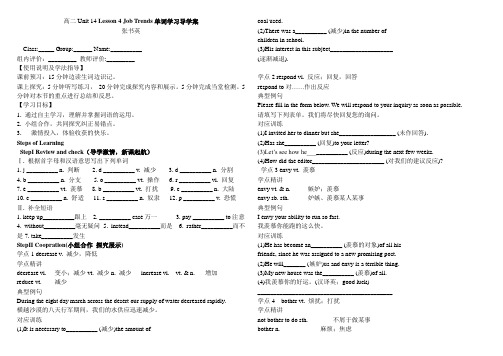
高二Unit 14 Lesson 4 Job Trends单词学习导学案张书英Class:_____ Group:______ Name:__________组内评价:_________ 教师评价:_________【使用说明及学法指导】课前预习:15分钟边读生词边识记。
课上探究:5分钟听写练习,20分钟完成探究内容和展示。
5分钟完成当堂检测。
5分钟对本节的重点进行总结和反思。
【学习目标】1. 通过自主学习,理解并掌握词语的运用。
2. 小组合作,共同探究纠正易错点。
3. 激情投入,体验收获的快乐。
Steps of LearningStepI Review and check(导学激情,新课起航)Ⅰ. 根据首字母和汉语意思写出下列单词1. j __________ n. 判断2. d __________ v. 减少3. d __________ n. 分割4. b __________ n. 分支5. o __________ vt. 操作6. r __________ vi. 回复7. e __________ vt. 羡慕8. b __________ vt. 打扰9. c __________ n. 大陆10. c __________ n. 舒适11. s __________ n. 奴隶12. p __________ v. 恐慌Ⅱ. 补全短语1. keep up__________跟上2. __________ case万一3. pay __________ to注意4. without__________毫无疑问5. instead__________而是6. rather__________而不是7. take__________发生StepII Coopration(小组合作探究展示)学点1 decrease v. 减少,降低学点精讲decrease vi. 变小;减少vt. 减少n. 减少increase vi. vt. & n. 增加reduce vt. 减少典型例句During the eight day march across the desert our supply of water decreased rapidly.横越沙漠的八天行军期间,我们的水供应迅速减少。
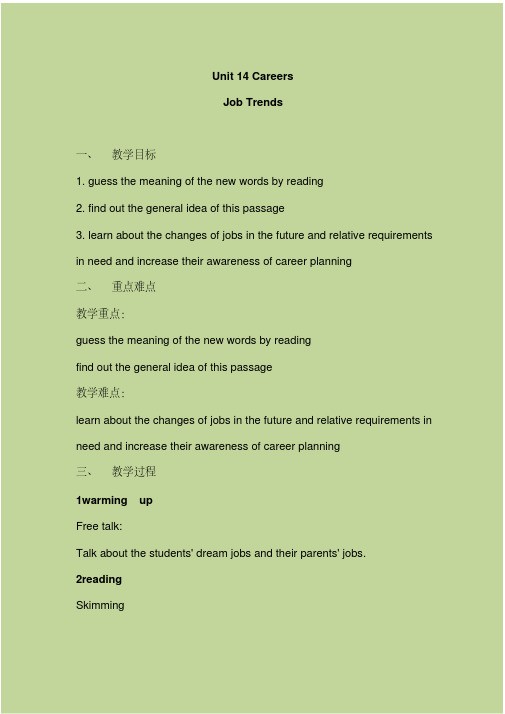
Unit 14 CareersJob Trends一、教学目标1. guess the meaning of the new words by reading2. find out the general idea of this passage3. learn about the changes of jobs in the future and relative requirements in need and increase their awareness of career planning二、重点难点教学重点:guess the meaning of the new words by readingfind out the general idea of this passage教学难点:learn about the changes of jobs in the future and relative requirements in need and increase their awareness of career planning三、教学过程1warming upFree talk:Talk about the students' dream jobs and their parents' jobs.2readingSkimming1. The teacher reads the passage and the students tell the meaning of the new words by referring to [My dictionary].2. The students read the passage again and find out the general idea of the passage.3Scanning1. Read the passage carefully and fill in the form.2. Group work (Some more tasks for better understanding of the passage.)(1) T/F(2) Answer the questions(3) Divide the passage into 3 parts.4Consolidationmean?1. Discussion:What does the title “Survival of the Fittest”2. One paragraph is missing from the passage. Where does it belong to?5HomeworkWrite a short passage with the title “My future job”四、课堂小结During this class we try to guess the meaning of the new words andmore, wefind out the general idea of the passage by reading. What’slearnt about the changes of jobs in the future and relative requirements in need and increased our awareness of career planning。
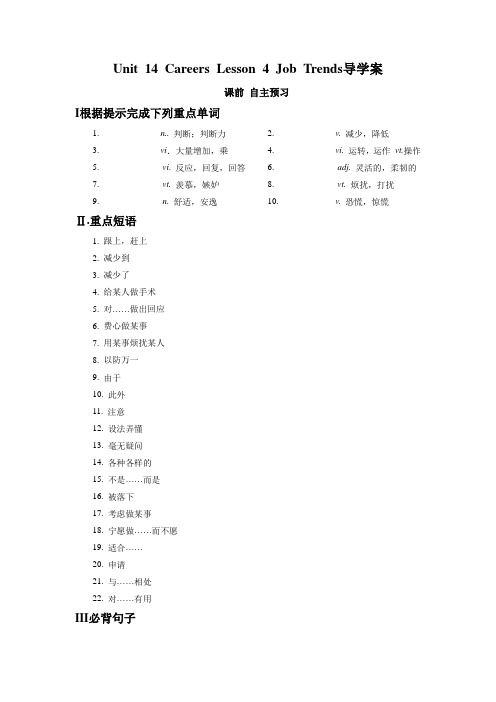
Unit 14 Careers Lesson 4 Job Trends导学案课前自主预习I根据提示完成下列重点单词1. ____________ n.. 判断;判断力2. ____________v. 减少,降低3. ____________vi.大量增加,乘4. ____________vi. 运转,运作vt.操作5. ____________ vi. 反应,回复,回答6. ____________ adj.灵活的,柔韧的7. ____________ vt.羡慕,嫉妒8. ____________ vt.烦扰,打扰9. ____________ n.舒适,安逸10. ____________v. 恐慌,惊慌Ⅱ.重点短语1. 跟上,赶上______________2. 减少到______________3. 减少了______________4. 给某人做手术______________5. 对……做出回应______________6. 费心做某事______________7. 用某事烦扰某人______________8. 以防万一______________9. 由于______________10. 此外______________11. 注意______________12. 设法弄懂______________13. 毫无疑问______________14. 各种各样的______________15. 不是……而是______________16. 被落下_____________17. 考虑做某事_____________18. 宁愿做……而不愿_____________19. 适合…… _____________20. 申请_____________21. 与……相处_____________22. 对……有用______________III必背句子1. There is no doubt that all this new technology is changing the way we work and offering many other ways of working.2. Citizens of the world’s richest and most adva nced nations will find it more and more difficult to keep up with the demand for change.3. It’s not about making men more like women,but helping men to communicate as well.Period 1 Fast Reading目标:1. To get the general ideas of the text .2. To learn Reading Strategies.Teaching steps:Step One :what kind of job do you think will be great?Step Two:Read the text and do ex. 2 and ex. 3. (教材P29)Step Three:Work in group to find out the key phrases.Period 2 Language Points目标:To master the important language points in this lesson.课堂互动探究§核心词汇讲·练·悟1. decrease v.减少,降低decrease by... 减少了...decrease from... to... 从...减少到...词性拓展:decrease n. 减少;减少量a decrease in ... ...的减少on the decrease 在减少应用:(1)The club members ________ ____ two hundred.该俱乐部的会员减少至200人。
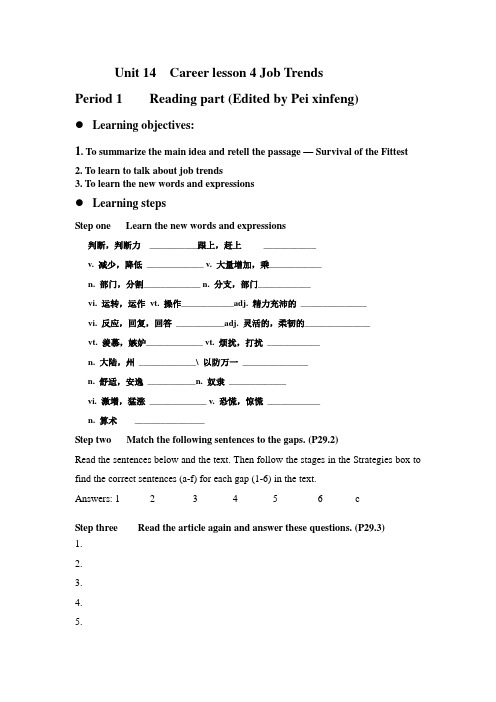
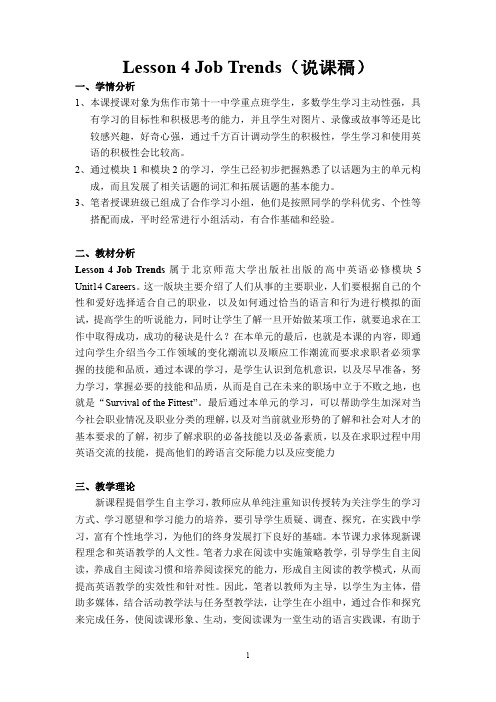
Lesson4Job Trends(说课稿)一、学情分析1、本课授课对象为焦作市第十一中学重点班学生,多数学生学习主动性强,具有学习的目标性和积极思考的能力,并且学生对图片、录像或故事等还是比较感兴趣,好奇心强,通过千方百计调动学生的积极性,学生学习和使用英语的积极性会比较高。
2、通过模块1和模块2的学习,学生已经初步把握熟悉了以话题为主的单元构成,而且发展了相关话题的词汇和拓展话题的基本能力。
3、笔者授课班级已组成了合作学习小组,他们是按照同学的学科优劣、个性等搭配而成,平时经常进行小组活动,有合作基础和经验。
二、教材分析Lesson4Job Trends属于北京师范大学出版社出版的高中英语必修模块5 Unit14Careers。
这一版块主要介绍了人们从事的主要职业,人们要根据自己的个性和爱好选择适合自己的职业,以及如何通过恰当的语言和行为进行模拟的面试,提高学生的听说能力,同时让学生了解一旦开始做某项工作,就要追求在工作中取得成功,成功的秘诀是什么?在本单元的最后,也就是本课的内容,即通过向学生介绍当今工作领域的变化潮流以及顺应工作潮流而要求求职者必须掌握的技能和品质,通过本课的学习,是学生认识到危机意识,以及尽早准备,努力学习,掌握必要的技能和品质,从而是自己在未来的职场中立于不败之地,也就是“Survival of the Fittest”。
最后通过本单元的学习,可以帮助学生加深对当今社会职业情况及职业分类的理解,以及对当前就业形势的了解和社会对人才的基本要求的了解,初步了解求职的必备技能以及必备素质,以及在求职过程中用英语交流的技能,提高他们的跨语言交际能力以及应变能力三、教学理论新课程提倡学生自主学习,教师应从单纯注重知识传授转为关注学生的学习方式、学习愿望和学习能力的培养,要引导学生质疑、调查、探究,在实践中学习,富有个性地学习,为他们的终身发展打下良好的基础。
本节课力求体现新课程理念和英语教学的人文性。
Unit14CareersLesson4JobTrends教学设计1-优质公开课-北师大必修5精品Unit 14 CareersLesson 4 Job Trend教课方案ObjectivesTo practise matching sentences with sentence gaps in a text.To practise vocabulary related to work and jobs.To practise collocations (verb + noun, verb + adverb, verb+ adjective).Possible problemsIf students read at sentence level rather than at discourselevel, i.e. connecting sentences within a paragraph, they may find difficulty fitting in the missing sentences.Students may have problems with collocations of words.Teaching pointsThe article describing future work trends is based on Future Shock, a book by Alvin Toffler, a social psychologist.His book analysed the effects of rapid technological change on the individual, the family and society.Quote: Katherine Whitehorn was a popular British journalist and writer in the 1970s/80s.Routes through the materialIf you are short of time, set Exercise 7 for homework and omit Exercise 5.If you have time, do the Option activity.If you have two periods for this lessons, a suitable naturalbreak is after Exercise 5.ReadingBefore you startUnit14CareersLesson4JobTrends教学设计1-优质公开课-北师大必修5精品Exercise 1Job areas: agriculture, coal mining, information technology,the media, professional services, shipbuilding, steelSkills: communication skills, computer skills, driving,language skills, organizational ability, typingQualities: co-operation, creativity, cultural awareness,flexibility, initiative, motivationReadthroughtheKeyWordswiththeclass.Elicitspecificexamplesof“ organisa bility ” (e.g.planningyour work,organising a meeting) and“ communication ski on the telephone, in meetings).Students then discuss the questions in pairs andmake notes of their ideas.The pairs then exchange views as a class.Read to learnExercise 2Read through the strategies with the class. Follow the stages reading the firsttwo paragraphs and sentences a-f toshow students how to find a sentence thatmatches the gap.Students work individually, following the stages in theReading Strategies and fitting the sentences into the gaps.Students compare answers in pairs before checking answers as a class.Answers1 d2 a3 b4 f5 e6 cExercise 3Students read the article again and make notes of theanswers.Students work in pairs comparing their answers.Suggested Answers1 The speed of change that affectspeople’ s lives and work.2 business and professional services, the media, informationtechnology,biosciences3 People will have different contracts, not work for one company.4 They will be organised more democratically.5 communication skills, computer skills, working with people fromdifferent cultures6 You can live where you want, continue your studies and have a lot more free time.Students discuss whether they agree with the predictions in the text. Do they think people will have more free time?Will agriculture continue to decline? What will happen if it does?Exercise 4Read the example prediction with the class and compare the wording withthe original wording in the text. Elicitanother prediction from the students and have them use their own words to express the idea.Students work individually, writing down some of the predictions in the textin their own words.Some of the students then read their predictions to the class.Exercise 5In pairs, students discuss what they can do to improve their future career prospects. Encourage students to talkabout a specific career if they know what they want to do and to talk more generally if they have not yet decidedwhat they want to do.Some of the students then report their ideas to the class.Vocabulary: CollocationsExercise 6Students work in pairs, classifying the words and puttingthem in the correct column in the table.Answersverb + noun: have a free time, pay attention, take a deep breathverb + adverb: do badly, react quickly, rise dramaticallyverb + adjective: become self-employed, feel comfortable, find (something) difficultExercise 7Students do the exercise individually. Ask them to pay attention to the verb tense.Check students’ answersavingbyh them read out the sentences.Answers1 feel comfortable2 rose dramatically3 have free time4 become self-employed5 react quickly6 find / difficult / do badlyExercise 8Students work in pairs completing their vocabulary networks with the wordsin the list.Check students ’ answers by having them read out the four verb collocations for each verb.1 an exam2 somebody a favor3 your homework4 your best5 an excuse6 a mistake7 money8 a suggestion 9 my own business10 an accident 11 a career15 married 16 a promotionExercise 9Give students time to work out some sentences about themselves using the collocations from Exercise 8.Students then work in pairs saying sentences about themselves. Some of the students say their sentences to theclass.QUOTE ⋯ UNQUOTERead the quote with the class and ask students to describe an ideal job for them which they like doing and are paidto do.PracticeWrite these sentences on the board, leaving a gap between the two sentences: Frank had worked as a shipbuilder since he left school.Because of this, he lost his job.Carol was surprised when the Careers Adviser asked her if she liked animals.She hadn ’ t thought of doing that before.In pairs, students discuss and write the missing sentence(s).Tell them they can write more than one sentence ineach text if they want to.The pairs then read out their texts to the class.Extension and homeworkBesides the job trends described in the text, will there be any other changesin the job areas? Ask students to usetheir knowledge and imagination to predict other changes that are likely to take place in the workplace in 20 years.They can either discuss in groups or as a whole class.。
Unit 14 CareersLesson 4 Job TrendsThis period mainly introduces some knowledge to the people engaged in the main occupation, and people should choose to suit their own profession according to their own personality and hobbies. And how to perform a simulated interview with proper language and behavior as well as improve the ability of students to hear, and let students understand that once they start doing a job, they have to pursue success in their work.Through the study of this unit, we can help students deepen the understanding of the current social occupational situation and professional classification, as well as the understanding of the current employment situation, and the understanding of the basic requirements of the society.Job areas: farming, coal mining, information technology, the media, services, building, steel productionSkills: communication skills, computer skills, driving, language skills, typingQualities:creative, flexible, hard-working, motivated, understanding, helpful, good judgment 【能力目标】To practice matching sentences with sentence gaps in a text.To practice vocabulary related to work and jobs.【情感目标】Give advice on the job choice..【教学重点】1. To learn some useful expressions2. To practice finding correct sentences for each gap by using the reading strategies【教学难点】1. To learn to use the reading strategies in a passage with gap2. To learn to use the important phrasesMultimediajudgment decreasearithmetic multiplydivision branchoperate dynamicrespond flexibleenvy bothercontinent comfortin case keep up withslave boom panicStep2. Lead inDiscussion:1. What job area do you want to commit yourself to in the future? Choose one from the following. TeacherDoctorBarberWriterAstronautScientistArtistTV presenterActor2. What skills and qualities are useful to get a good job nowadays?Skills: communication skills, computerskills, driving, language skills, typing, etc.Qualities: creative, flexible, hard-working, motivated,understanding, helpful, good judgment, etc.Step2. ReadingFast readingJudge the following sentences to be True (T) or False (F).1. Toffler’s prediction has come true.2. There is nothing we can do to keep up with the demand for change.3. The number of jobs in information technology will go down dramatically.4. The idea of “job for life” is still fashionable.5. People will work for small, dynamic companies as well as big companies.6. It doesn’t matter if one can’t cope with cultural differences.7. People prefer to work from home rather than go to office.Careful readingTask 1: Read the sentences below and the text carefully. Find the correct sentences (a-f) for each gap (1-6) in the text.a) On the other hand, the services industry, the media and information technologyare booming.b) Because of this, people who work with computer will be in much greater demand.c) However, understanding other people —their minds, culture and history — will be very important.d) First of all, don’t panic.e) They will also need people who can work together and get on well in a team.f) Because of this, workers will have to be more flexible.Task 2:Fill in the blanks.Read the text again and compare the past to the future.Task 3: Answer the following questions:1.What is “future shock”?“Future shock” is that between now and 21st century, citizens of the world’s richest and most advanced nations will find it more and more difficult to keep up with the demand for change.2. What is one of the job areas of the future?The services industry, the media and information technology.3. How will jobs change?People will not work for one company.4. How will companies change?They will be organized more democratically.5. What skills and personal qualities will people need?Communication skills, computer skills,working with people from different cultures.6. What personal benefits will the new situation bring?You can live where you want, continue your studies and have more free time.Step3. Languages Points1. advanced adj.1) 高度发达的,复杂的England is an advanced industrial country.英国是一个发达的工业国家。
Module 5 Unit 14 CareersLesson 4 Job Trends (阅读课导学案)学习目标:1、运用阅读技巧识别出文章各段落的主题,填补段落间缺少的句子,使整篇文章连贯顺畅;2、了解职业市场的变化和发展趋势,思考个人的职业发展。
学习过程:Step1:Lead inStep2:Discussion: In pairs, discuss these questions on P28. The Key Words may help you.Step3:Reading Strategies.Read the text and the sentences on P29. Then follow the steps in the ReadingStrategies to find the correct sentences(a---f) for each gap(1---6) in the text.1. First, read the text to get the general idea.What does the whole text talk about ?•Change of jobs•Possible development of the job market2. Read each paragraph with a sentence gap again and identify the topic of paragrph 3,4,5,6,8.para 3: The job areas will be most affected by changes.para 4: Information technology will be booming.para 5: Few people will have a job for life.para 6: Companies will operate in different ways.para 8: Businesses will be more international.3. Read the sentences before and after the gaps, thinking of clues about the missing sentence.4. Then,look at the missing sentences and find out the linking words.on the other hand because of however first of all also5. For each gap,find a sentence that matches the topic of the paragraph and links with thesentences before and after it.Answer: 1 d 2 a 3 b 4 f 5 e 6 cStep4:Skimming.Read the text and get the main idea for each part.⏹Paragraph 1 ( C ) A. Changes in the future⏹Paragraph 2--3 ( D ) B. Skills and qualities needed⏹Paragraph 4--6 ( A ) C. Prediction⏹Paragraph 7--10 ( B ) D. Changes in job areas nowadaysStep5:Listening: Listen to the tape and decide whether the following are true or false.1.Toffler’s Prediction has come true. T2. There is nothing we can do to keep up with the demand for change. F3. The number of jobs in information technology will go down dramatically. F4. The idea of “job for life” is still fashionable. F5. People will work for small, dynamic companies as well as big companies. T6. It doesn’t matter if one can’t cope with cultural differences. F7. People prefer to work from home rather than go to office. TStep6:ScanningStep7:Discussion.What does the title “Survival of the Fittest” mean?Because of the constant change of the job market, you have to keep learning new things and developing new skills so that you can survive.Module 5 Unit14 Careers Lesson 4 Job Trends 阅读课导学案第1页(共1页)。
Unit 14 Lesson 4 Job Trends学案Part1. Preview the key words and phrases.1) Words to understand (English-Chinese)1 .___________ n.判断2 .___________ v减少3 .___________ v嫉妒,羡慕4 .___________ v反应,回复5 .____________ adj 灵活的6 .division______________7 .comfort______________8 .operate _____________9. boom _____________10 .panic _____________2). Find words in the text with the following meanings.1. keep______________ 赶得上,和…保持联系2. pay_____________ 注意,重视3. work___________ 解决,算出制定出4. ____________doubt__________ 毫无疑问5. __________place 发生,举行6. ___________ force动力7. ______ all首先;尤其8. according _________ 按照,据…说9. a ____________ of 各种各样的10. have an _______________ 在…方面有优势Part2 Reading comprehension(I) Read the text quickly and get the main idea of the text.What is the main idea of the text?A.Changes in the future.B.The work in the future.C.The future job trends and ways of working.D.The features of work.(II) Read the text carefully and choose the right topic for each paragraph.Changes in job ideas Changes in companies Benefits that the new technology brings to us Improve language skills—English Improve computer skills Changes in job areasBoom in IT The prediction of Future Shock Improve communication skills Dealing with changesPart3 Language points1.keep up with赶上,跟上,与..保持联系,继续支付,继续做讲解写出下列句中keep up with的含义① I had to type fast to keep up with that typist._____________②She has a hard time in keeping up with her old classmates in junior high school. _____________③If you don’t keep up with the payment, your bank account will be frozen. _____________2.decrease(1)v.减少,减小,降低(2)n.减少;减少的量讲解① As the chart shows, the number of the new students has decreased______160 this year.②The production of wheat decreased______20% because of the dry weather.③The flood led to a considerable decrease__________ production.These data confirm that the population of this city is ________the decrease.3 operate(1)运转,运作;动手术(2.) (2)使运作;操作讲解①The doctors determined to operate__________ the patient in an instant.②Nuclear plants are expensive to build, though cheap_________(operate).③Jenny hated hospitals and didn't like the idea of having an______________(operate).4.respond vi反应,响应;回答,回复讲解①Why Cindy didn't respond _________any of his emails was beyond my comprehension.②Villagers didn’t stand by. Instead, they responded__________ offers of help.③Don' t respond________ any emails requesting personal information, no matter how official they look.④He made no response_________ my question, and went on with his movie.5.envy (1)vt.羡幕,炉忌(2) n.羡幕,炉忌讲解①My companion watched the others____________ envy.②Colleagues were___________(envy)of her success .③When hearing the big fortune he made, his neighbours were all green__________ with envy.④His new car is the envy__________ his friend.6.bother v.费心,麻烦;烦扰,打扰;使担忧,使不安讲解①It was such a stupid question that I didn't even bother____________(respond).②I don't know why you bother___________ that crowd.③I can' t be bothered__________ that crowd.④I am wondering why you are always bothering the physicist_____________ such simple questions.7.in case以防万一;万一;假如讲解①________ _________Emily isn’t he re, the receptionist will take you out there safety.②This insurance guarantees you against loss________ _________ _________ _________(如果发生火灾)。
③________ _________ _________(如果那样的话),they will have an advantage over their competitors.④I can’t make out why I can’t do it. __________ ___________ ___________(无论如何),I ‘m going to try.⑤___________ ___________ ___________(在任何情况下都不)should we fail to keep anappointment.8. There be+主语+非谓语动词讲解①There are still millions of people__________(suffer) from hunger nowadays.②There will be some volunteers___________(help)in remote areas.③There is still some support_____________(give) by the local people.④There are some students on the play ground_____________( play) basketball⑤I also grow wheat and vegetables so there are many things______________(look) after.⑥ln1812, the year Charles Dickens was born, there were 66 novels______________(publish)in Britain.Part3 基础知识自测单句语法填空①One of his friends had stopped to make a bicycle repair, but they had encouraged Mac to carry on, and they would catch_________ with him soon.②So even of emissions were to begin__________(decrease) today, we would still face the challenge of adapting to climate change.③With such models, scientists have found out some key principles_______(operate) in food webs.④This one stranger responded beautifully_________ my small crisis, bu t she actually wasn’t the only one.⑤She was the envy_________ the whole community.⑥Several years ago I received a letter from seventeen-year-old Kerry, almost always______________(bother) by things.⑦This time, we stayed together, ____________case anything else unusual happened.⑧By connecting directly with customers, and by responding quickly__________ changes in the markets as well as in the ecosystems(生态系统),small farmers can keep one step ahead of the big guys.⑨Hannah’s Place_____________(divide) into several areas, providing shelter for people when it is so cold that sleeping outdoors can mean death.⑩But driverless car ownership could increase as the prices drop and more people become____________(comfort) with the technology.。